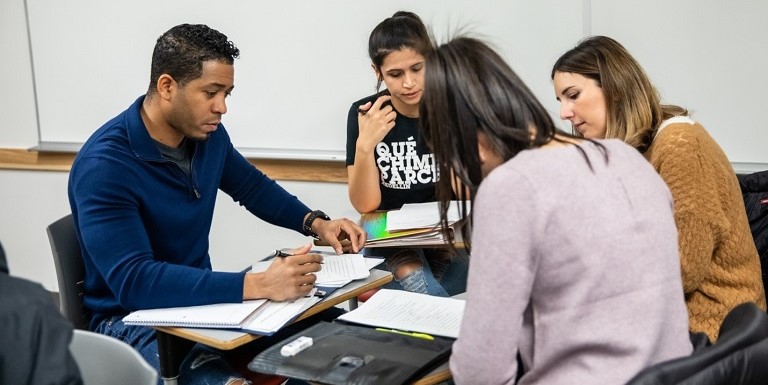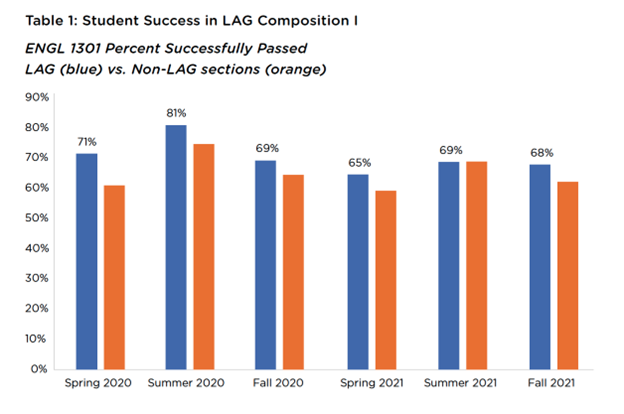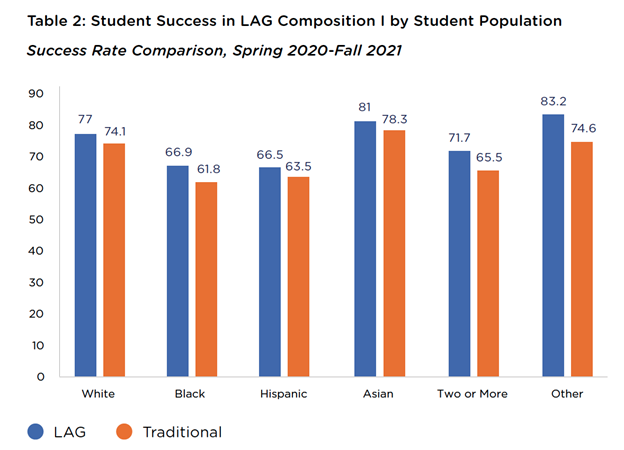Austin Community College District: The Liberal Arts Gateway Program - Driving Student Success Through Faculty Empowerment

To revitalize the teaching of liberal arts and humanities and improve outcomes in gateway courses, motivated faculty and the Liberal Arts and Humanities Division Dean at Austin Community College formed the Liberal Arts Gateway (LAG)—an incubator for curricular innovation that increased student engagement and retention. Starting with seven faculty in spring 2020, the program now includes almost 50 faculty and offers over 75 sections of redesigned gateway courses in four disciplines. Early data reveal that LAG courses, specifically in the formative Composition I course, outpace traditional courses in student success and engagement, notably for students of color. In addition, faculty involved in the program have found reinvigorated purpose and feel empowered to create courses that allow their disciplines to relate directly to the student experience.
The LAG course redesign process is founded on the following guiding principles:
- Equity and Inclusion: Courses should be redesigned with an awareness of barriers to success and strategies to help students persevere.
- The Student Experience: Course redesign should focus on student motivation, ownership of learning, and production of meaningful work.
- Responsiveness to Future Stakeholders: Faculty involved in the redesign should take into consideration the student’s next course in the sequence, next college, and workforce or professional path.
Based on these foundational principles, faculty in individual disciplines created a set of discipline-specific classroom guidelines and practices. For instance, LAG faculty in ACC’s Composition and Literary Studies Department ensured that their courses and pedagogical practices paid particular attention to the ideas of pluralism, literacies, evidence, equity, and engagement. How these guidelines are translated into practice can be seen in the courses developed by the faculty. In Professor Wendy Lym’s composition course—Hot Topics, Cool Heads—students use persuasive writing skills to tackle a local problem by identifying a specific individual who can address their problem or concern and documenting a practical solution to the problem. Students in Dr. Lym’s class have advocated for themselves and their community, arguing for such diverse things as better products to decontaminate fire-fighting gear, more equitable rules from public housing managers, and better accommodation for parents who work night shifts and want to eat breakfast with their elementary school children on the school campus. Similarly, Professor Jenifer Hamilton Hernandez’s Food as Narrative course focuses on an exploration of food cultures and the depiction of food culture in local and national media. Students are prompted to write their own food narratives, essays, journal entries, and research papers, moving them from the position of consumer of food narratives to producer of this material. A complete list of redesigned courses and descriptions is available on the LAG website.
Student response to the redesigned LAG courses has been overwhelmingly positive. Over two years, more than 85 percent of students taking LAG courses rated their course to be either one of the best or among the better courses they took that semester. In fall 2021, 89 percent of students said they “felt included in the class.” Eighty-eight percent of survey respondents noted that the class “better prepared them for future college courses” and that the coursework was relevant to their lives. Students indicated that the LAG courses fostered a sense of belonging and purpose. One student said, “This is my fourth year in college but my first at ACC and I’ve never taken anything like this [LAG class].” The student went on to say that the class “creates a natural desire to do well” and “leaves you questioning and wanting to learn more.” Another student noted that they “loved every single second,” and that the class not only gave them confidence, but helped them to recognize that the amount of reading they do for the course has value.
In addition to feedback on student surveys, the first six semesters of program data show that students in LAG Composition I courses outperformed students in regular Composition I courses (see Table 1). Furthermore, students of color showed solid gains in LAG courses, outperforming their peers in traditional sections, as shown in Table 2. (Note: Both tables compare LAG students to traditional students taking Composition I excluding dual credit and early high school students.)


Qualitative data indicate that students succeed at a higher rate in LAG courses because the course material is relevant to their lives. The professors also created a welcoming atmosphere that made students comfortable and helped them succeed. In addition, students noted that they understood the value of the course and its connection to other aspects of their academic and personal lives. One student who had attempted college twice and “quit within the first two weeks” both times said, “I ended up going to class and from day one, the professor made me feel at ease.” Another student wrote, “Honestly, I didn’t think a class could allow me to feel like I can . . . use these concepts not only in my college career but throughout life.” For more data, please see LAG’s Program Effectiveness Report from May 2022.
The program’s success extends not just to students, but to faculty as well. Faculty involved in the Liberal Arts Gateway have found the initiative enormously energizing and rewarding. One faculty member who participates in the program noted that,
The idea exchange that happens in LAG is immediately relevant, while other [professional development] opportunities tend to be more generic and so less immediately useful. LAG is a wonderful community for . . . challenging one's ideas and practices, resulting in growth intellectually and as an instructor.
Another instructor said, “I LOVED the opportunity to design my own course based on the literary and textual interests and projects I’ve already been researching because it allowed me to merge my personal projects with my professional practice.” Finally, the fact that faculty were able to focus on their specific disciplinary interests in redesigning courses led another professor to comment that LAG “has the distinction of being the only real discipline-specific professional development opportunity for [Composition and Literary Studies] faculty” and that being part of LAG forces her to be more conscious of her objectives and outcomes.
The Liberal Arts Gateway at ACC continues to expand, adding more faculty and redesigned courses in the disciplines in which it already has a firm foothold. In addition, faculty in the Student Development and World Languages departments formed their own LAG committees in fall 2022 to develop discipline-specific LAG classroom guidelines and courses to pilot in the coming year. LAG leadership has presented at national and state conferences like the AAC&U Annual Meeting, Community College Humanities Association Conference, and Texas Pathways Institute. In addition, San Jacinto College in Houston, Texas, is in consultation with LAG partners at ACC to institute a similar program at their institution. LAG appears to be delivering success not just through student engagement, but through empowering faculty to buy in to the framework of the program.
The foundational principles of LAG help explain its success:
- Course revitalization is faculty-driven and collaborative.
- The primary emphasis is on equity and student engagement.
- Faculty are encouraged to identify fundamental principles of their discipline.
- Faculty rediscover passion for their discipline and invite students to share in that rediscovery within the classroom.
- Faculty are offered practical and continuing help through resources like disciplinary toolkits, assignments, peer observations, and ongoing engagement in communities of practice.
In terms of student success, the formula is very simple: An energized professor helps motivate and energize students. Most importantly, however, the LAG principles foreground what research tells us works best to foster retention and student success: community building among faculty and students and assigning work that is relevant to students’ lives.
Arun John is Associate Professor, Composition and Literary Studies, and Chair, Liberal Arts Gateway, at Austin Community College District in Austin, Texas.
Opinions expressed in Member Spotlight are those of the author(s) and do not necessarily reflect those of the League for Innovation in the Community College.










